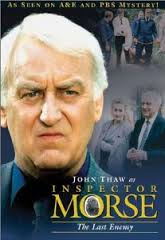
THE LAST ENEMY
UK, 1989, 100 minutes, Colour.
John Thaw, Kevin Whately, Barry Foster, Amanda Hillwood, Michael Aldridge, Tenniel Evans, Lana Morris, James Grout.
Directed by James Scott.
The Last Enemy is one of the earlier Inspector Morse stories. It has a very distinctive Oxford setting, amongst the world of academia, the ambitions and the political rivalries, leading to murder.
The film opens with the discovery of the dismembered body, which leaves Morse and Lewis to visits to London, visits to the Master of Beaumont College and learning about the intricacies of university politics. at the film uses many locations in the colleges creating the academic atmosphere.
Barry Foster, often a villain as in Hitchcock’s Frenzy, is the ambitious master of the College. Amending who would is the forensic doctor. And veterinary Lana Morris steals her scenes as a flirtatious landlady in London.
There are some revelation of Morse’s past life, his studies, rivalries with the Master, the presence of a woman and more saying that he had a good memory but prosaic character. And, for much of the film, Morse is suffering from toothache.
1. The popularity of the long-running series? Television movies? With style? The popularity of Morse and his personality, enigmatic and mannered style? The personality of Lewis? Their relationship? The solving of the crimes? Intricacy of the plot? The psychological dimensions, the mystery and clues? Police work and solving the mysteries with their own abilities? The work of Colin Dexter?
2. The Oxford settings, the city and landscapes, the cityscapes, the buildings? Comments about Oxford and Oxford society? The ironies about Oxford and the dons? The university city? Ordinary people? Their interconnections? So much beauty – and so much crime?
3. The quality of the mystery, character-driven? Sufficient information, sufficient clues? The exploration of character and clues?
4. John Thaw as Morse, his personality, the changes over the years, yet remaining the same? The mystery of his name? His crusty manner, the bachelor (but romantic at times)? His own authority – exercised over Lewis – and his reaction to authorities? Promotion or not? The changing of his attitudes towards Lewis, bossing him, patronising him about education and culture? The issue of music? Drinking ale? His car? Quietly at home, at work? With Lewis, understanding the situations and characters, the deductions? His being a good listener – but critical?
5. The contrast with Lewis, the family man, the ordinary policeman, education and lack of education, his being put down by Morse – but enjoying his comeuppance now and again? Music and his ignorance? The first reactions, Lewis being patient? His admiration for Morse, having to do so much leg work, to formulate hypotheses? Working under pressure? Collaborator and partner of Morse?
6. The police authorities in Oxford? The medical examiners – and Morse and his attitude towards the female authorities? Sexist and patronising? Changing?
7. The quality of the film as a crime thriller, a thriller with intelligence and demands on the audience?
8. The introduction to the crime, the credits, the background in Oxford, beyond?
9. The range of personalities, motives? Truth and concealment? Jealousies? Deceits and angers? The academic and religious backgrounds?
10. The opening with the dead body, hacked to pieces, investigations, the eventual identification of the victim, the back story?
11. Morse called to the master of Beaumont College, the past connections, the discussions, the lunch and its boredom? Morse noticing Miss Burns? Later meeting her in London, hearing her story, her suspicions, Kerridge and his opposition, learning about the master from Kerridge? Her later seeing the Master, his hold over her, issues of plagiarism, his death?
12. The Oxford politics, promotions, Drysdale, enmities, his cancer, going to Italy? Kerridge, his books, antagonism, homosexuality, the fear of scandal? The Master coming through this, his promotion, the Sheldonian lecture, its prestige, his political contacts and influence, the possibility for his heading a Royal commission, Ballarat not putting his name forward?
13. The domestic sequences, Morse and his affability, despite his toothache and the visit to the dentist, with the Master’s secretary, taking her out for a drink, Dr Russell, the drink on her birthday, her friend arriving? Morse and his never marrying? The contrast with Lewis, talk about his family and his children?
14. Morse and Lewis, the visits to London, the research, visiting Kerridge’s flat, the flirtatious landlady, the visit to Whitehall and the discussions with the political adviser? Morse criticising Lewis’s driving?
15. The chief superintendent, always wanting appearances to be satisfactory, putting Morse down, having to admit the truth?
16. Kerridge, the television letter, the same with the Master? The setup?
17. The murders, Drysdale and his plan, killing Ballarat, Ballarat running off with his wife years earlier? The attempt on Kerridge, Kerridge telling the truth, the Master killing Kerridge? Drysdale and his shooting the Master?
18. A satisfactory Morse murder mystery?